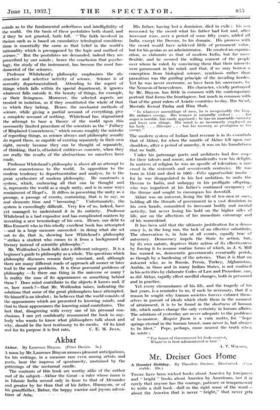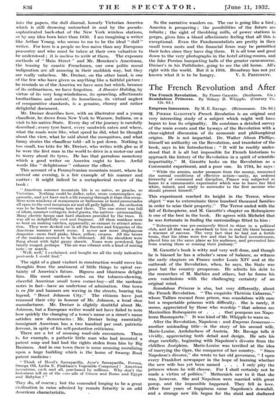Mr. Dreiser Goes Home
A Hoosier Holiday. By Theodore Brewer. Blasi rated. (Con- stable. 10s.) THERE have been wicked books about America by foreigners and " bright " books about America by Americans, but it ifi rarefy that anyone has the courage, patience or temperament to write a dull book—dull in the right sense of the word— about the America that is never "bright," that never gets into the papers, the dull diurnal, homely Victorian America which is still drowsing untouched in s011i by the pseudo- sophisticated back-chat of the New York wireless stations, or by any idea born later than 1850. I am imagining a writer like Arthur Young, who seems to me to be the ideal " dull " writer. For here is a people no less naïve than any European peasantry and who must be taken at their own valuation to be understood ; it is useless to write at them. The exposure methods of Main Street '' and Mr. Mencken's Americana, the teasing by caustic Frenchmen, our own polite moral indignation are all amusing in their snobbish way, but they are really valueless. Mr. Dreiser, on the other hand, is one of the few who have given us anything like a faithful picture : he reminds us of the America we have seen but which, because of its ordinariness, we have forgotten. A Hoosier Holiday, by virtue of its very long-windedness, its sprawling, affectionate brotherliness and naiveté, its homeliness, its virtual neglect of comparative standards, is a genuine, clumsy and rather delightful document.
Mr. Dreiser describes how, with an illustrator and a young chauffeur, he drove from New York to Warsaw, Indiana, on a visit to his native State. Every day of the journey is carefully described ; every tyre burst, every sandwich eaten and where, what the roads were like, what speed he did, what he thought about the view, what he said about the mosquitoes, and what funny stories the chauffeur told—all is put down. Nothing is too small, too trite for Mr. Dreiser, who writes with glee as if he were the first man in the world to drive in a motor-car and to worry about its tyres. He has that garrulous monotony which a good writer on America ought to have. Awful words like " delightsome " enhance the effect.
This account of a Pennsylvanian mountain resort, where he arrived one evening, is a fair example of his manner and matter : it might indeed be a metaphorical review of the book :
"American summer mountain life is so naive, so gauche, so Victorian. Nothing could be duller, safer, mom cornmonplaee ap• parently, and yet have such a lilt running through it than this scene. Here were windows of restaurants or ballrooms or hotel promenades all open to the cool mountain air and all gaily lighted. An orchestra was to be heard crooning here and there. The one street was full of idlers, summer cottagers, hotel guests, the natives—promenading. Many electric lamps cast hard shadows provided by the trees. It was all so delightfully cool and fragrant. All these maidens were so bent on making catches, apparently, so earnest to attract atten- tion. They were decked out in all the fineries and fripperies of the American summer resort scene. I never saw more diaphanous draperies—more frail pinks, blues, yellow, creams. All the brows of the maidens seemed to be be-ribboned. All the shoulders were flung about with light gauzy shawls. Noses were powdered, lips faintly rouged, perhaps. The air was vibrant with a kind of mating note—or search.
' -Well, well,' I exclaimed, and bought me all the truly indicative postcards I could find."
The sight of a giant viaduct in construction would move his thoughts from the sentiment of little things to epical cer- tainty of America's future. Bigness and bluntness delight him. His most sardonic notes on the tobacco-chewing, cheerful American small town corner-boy—all the sardonic notes in fact—have an undertone of admiration. One town is en file and banners arc waving in the streets, bearing the legend, "Boost Johnson City." The citizens have just renamed their city in honour of Mr. Johnson, a local shoe manufacturer. Mr. Dreiser is slightly doubtful about Mr. Johnson, but a European writer would not have failed to note how quickly the changing of a town's name or a street's name satisfies new democracies : Mr. Dreiser being essentially immigrant American has a two hundred per cent, patriotic fervour, in spite of his self-protective criticisms.
There are a lot of amusing road-side encounters. There is, for example, a pathetic little man who had invented a patent soap and had had the rights stolen from him by Big Business. And in one town there is some amusing moralizing upon a huge building which is the home of Swamp Root patent medicine :
" Think of Hood's Sarsaparilla, Ayer's Sarsaparilla, Peruna, Omega Oil, Lydia E. Pinkham's Vegetable Compound ! American inventions, each and all, purchased by millions. Why•don't the historians tell us of the cure-alls of Greece and Rome and Egypt and Babylon ? "
They do, of course ; but the concealed longing to be a great civilization in ruins admired by remote futurity is an odd American characteristic. So the narrative wanders on. The car is going like a bird ; America is prospering ; the possibilities of the future are infinite ; the sight of throbbing mills, of power stations in gorges, gives him a bland affectionate feeling that all this is exceptional. Even the Fundamentalists are pretty in their small town nests and the financial foxes may be permitted their holes since they have dug them. It is all true and good down to the very photographs in the hotel sitting-rooms, and the fake Persian banqueting halls of the greater caravanserai. Dreiser's in his Pathfinder, going to see the old home. All's right with the world. But it is 1916. Broadway has not yet known what it is to be hungry. V. S. PRITCHETT.



































 Previous page
Previous page